Are You Compatible? INFJs and Relationships
What do INFJs need and want in relationships? Today we’re exploring some common struggles and joys these types face when trying to find “the one.” As an MBTI® practitioner, I’ve been asked dozens of times if there is a “best match” for the INFJ, and I’m hoping to dive into that today as well (opinions are varied, but I ran a survey so we can see the results!).
Let’s begin!

The MBTI® can tell us where potential strengths and weaknesses lie, but it does not say ‘avoid this type or be with that type.’ There are pluses and minuses to any relationship, and people within a type can vary so much based on upbringing and environment. Yes, intuitives and intuitives tend to inherently understand each other’s perceptions better, as do sensors and sensors. However, you really can have a happy relationship with any type as long as you both do your best to be understanding and to work on balancing out your strengths and weaknesses.
Not sure what your personality type is? Take our new personality questionnaire here. Or you can take the official MBTI® here.
If you want more in-depth info on INFJs and relationships be sure to check out my eBook The INFJ – Understanding the Mystic
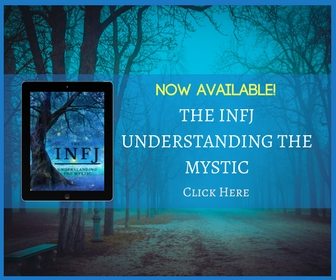
Table of contents
- What INFJs Want In Relationships
- What INFJs are Like in Relationships
- INFJs and Romance
- So what should you do to make your INFJ happy?
- What NOT to do:
- INFJs and Guardians (SJ types) in Relationships:
- INFJs and ESFJs
- INFJs and ESTJs
- INFJs and ISFJs
- INFJs and ISTJs
- INFJs and Artisan (SP Types) in Relationships:
- INFJs and ESFPs
- INFJs and ESTPs
- INFJs and ISFPs
- INFJs and ISTPs
- INFJs and Idealists (NF Types) in Relationships:
- INFJs and ENFPs
- INFJs and INFPs
- INFJs and ENFJs
- INFJs and INFJs
- INFJs and Rationals (NT Types) in Relationships:
- INFJs and ENTPs
- I NFJs and INTPs
- INFJs and ENTJs
- INFJs and INTJs
- INFJ Strengths in Relationships:
- INFJ Weaknesses in Relationships:
- What are your thoughts?
What INFJs Want In Relationships

Is the perfect soulmate too much to ask for? One of the struggles of being an INFJ is that of being a true idealist and a perfectionist. While Mystics are warm, affirming people by nature – they also tend to be over-achievers in relationships. They want to be the “perfect” partner, and also want their partners to be the “perfect” soulmates. Naturally, they want someone who will make the effort to truly know them (which can take a while as they’re very private), and someone who will listen to their greatest hopes and dreams and ambitions. An INFJ would passionately cling to a life of singleness over being married to someone or dating someone with whom they feel little passion or depth of feeling. INFJs are independently-minded, and while they long for a partner and soulmate in life, they have very little tendency to be desperate or to “settle” for anything less than someone with whom they share a very deep connection.
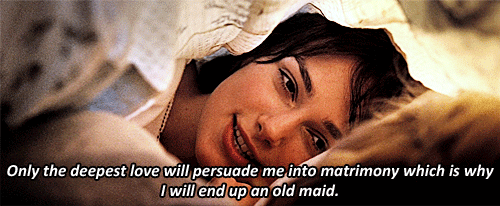
As David Kiersey so aptly puts it; “Finding that rare person with whom they can share their inner world is difficult for idealists, a painful process of trial and error, and often they vow not to date at all for periods of time rather than go through the search. For NFs, dating someone means more than physical fun or social experience; it is an opening of their heart and mind to the other person, in some cases a baring of their soul, and carries with it both a promise and an expectation of deep regard and mutual understanding.”
In relationships, INFJs usually seek intelligence (both intellectual and emotional), authenticity, and openness. And since they are always on a quest for personal growth, they want a partner who is seeking this same kind of personal or spiritual growth. They want to see the dark and light side of a person, not just the side you choose to show them. Beware! They’re pretty good at detecting phoniness or hidden agendas, so being honest and open is one of the best ways to impress them.
What INFJs are Like in Relationships
I may have painted INFJs to be quite a demanding group of people, and maybe you’re thinking “Wow! These people sound high-maintenance!” but let me add a point: INFJs are extremely loyal and understanding. Once they’ve made the decision to commit to a relationship with you, they will love you unreservedly and passionately, seeing the best that’s in you and overlooking a multitude of weaknesses. They have plenty of our own weaknesses, of which many of them are highly aware. That constant longing for personal growth? Yeah, that tends to make them hyper-aware of all the areas in which they are not growing “enough.” Personal weaknesses are easily overlooked, but if you degrade or criticize one of their deeply held values it’s not likely to go so well.
As perfectionists, INFJs work hard at their relationships to try to be the best they can be for their partner. Sure, they aren’t perfect, but no one’s going to stop them from trying to be. They hold themselves to a higher standard than they generally hold their mates and children. So yeah, sometimes they’re overly idealistic. But they’re also generously loving and deeply devoted to bringing you the ‘ideal’ love you’ve always wanted. Along the way, they’ll also try to bring you on a shared journey of growth, depth, and emotional connection. If you want a partner who’s a good listener, who cares about your feelings, who will support you through ups an downs, an INFJ is one of the best types for you. Just make sure you’re not taking advantage of their generosity and empathy (unfortunately, too many people do this!)
INFJs and Romance
Now let’s talk about the romantic side of the INFJ. They love to express their feelings through gifts; usually gifts with a symbolic meaning, like a beloved piece of music, a favorite book, a piece of artwork. They may write poetry, love letters, or find other ways to show you how deeply they really care. When in love, they often make themselves more vulnerable than is naturally comfortable for them. This is a bit scary and why it often takes them ample time to really move past friend into relationship territory. It may scare them to tell you that they love you, to write you that poem, or to have you listen to that song that describes how they feel. But showing you, or giving you, these long-locked pieces of their hearts, is all part of the beauty and depth of romance for them.
Keep in mind, INFJs usually are better at expressing their feelings through writing than through verbal communication (although this does vary from time to time). Many INFJs harbor deeper feelings than they say out loud. A great way of unlocking those feelings is by engaging in letter-writing (not just texting!) In letters or even emails, you will often see a side of the INFJ that they have a harder time showing in person.
INFJ Love Languages: The Keys to Connection
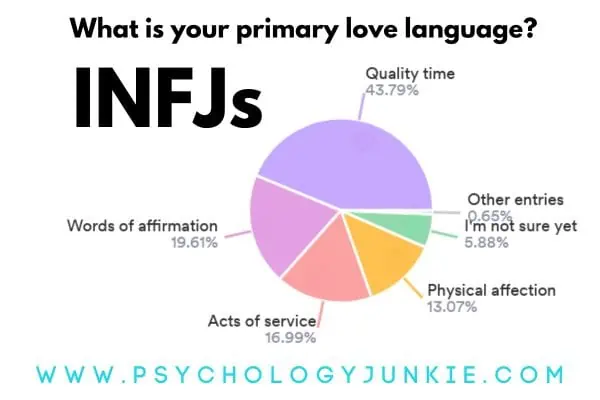
Just as a lock is designed to open with a specific key, the heart of an INFJ responds best to particular expressions of love. In a recent survey of over 480 individuals who identify as INFJs, the love language that stood out as most valued was Quality Time. This makes sense when you consider the premium INFJs place on authentic connections and sharing experiences that reflect a deep-seated presence and mutual engagement.
Closely following Quality Time, Words of Affirmation emerged as the second most treasured love language for INFJs. The importance they place on verbal affirmation aligns with their need for genuine connection and appreciation. Because they often perceive the subtext behind words, affirmations serve as a comforting assurance that the bond they hold is acknowledged and valued on a verbal level.
Acts of Service came in third, which is hardly surprising considering the altruistic and nurturing nature of many INFJs. When someone goes out of their way to ease their load or anticipate their needs, it communicates care and understanding in a tangible form. It’s the thoughtful doing, without prompt or expectation of reciprocation, that resonates deeply with them, affirming the solidity and commitment within the relationship.
In essence, these love languages resonate profoundly with INFJ’s heartstrings because they speak to what they hold dearest: meaningfulness, authenticity,
So what should you do to make your INFJ happy?
- Be 100% yourself.
- Don’t be scared to think outside the box.
- Listen to their passions and deep feelings.
- Talk about your passions and/or feelings.
- Have a hard time talking about feelings? Write them down! They love written communication.
- Be kind. They tend to be on the sensitive side.
- Always be tactful and considerate to them and others.
- Show curiosity about life and what it means
What NOT to do:
- Be passive-aggressive. INFJs do not handle this well and tend to give up on relationships where they’re faced with this regularly.
- Dismiss their theories or insights. Ni is an INFJs most advanced function. While they’re not always right about their insights, they are more than most.
- Criticize their sensitivity. INFJs are often highly-sensitive people, and things like loud noises, bright lights, and lots of commotion can make them extremely overstimulated.
- Criticize their intense emotions. INFJs sometimes struggle to hold in their feelings. Because their feeling function is extraverted, INFJs will easily understand other people’s feelings, but be unable to decipher their own. If they externalize (talk about) their feelings, they are then able to process them through Extraverted feeling. So being able to listen, give your input, and not judge is an essential part of being in a healthy relationship with an INFJ.
INFJs and Guardians (SJ types) in Relationships:
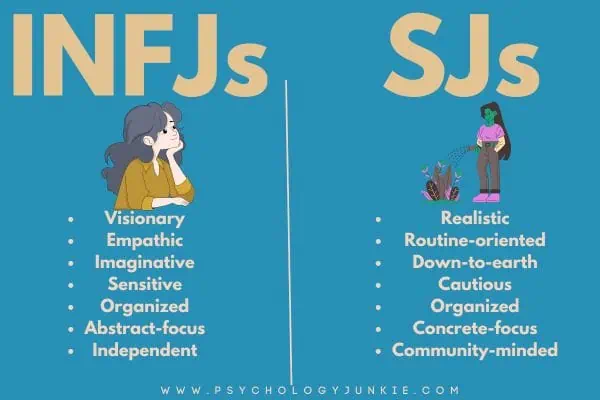
INFJs and Sensing-Judging types often lead comfortable, routine-oriented lives. There’s a steadiness and calm to these relationships, especially the ISJ and INFJ relationships. The SJs appreciate the warmth, passion, and sincerity of the INFJ. And Sensing-Judgers can feel like a stable force in the INFJs life since INFJs are prone to feeling of two minds about many things. In turn, the INFJ can add some creativity and intensity to the relationship that the SJ admires and appreciates. These two types will both take the relationship seriously and be very committed to each other. An INFJ usually (not always) will get along better with an ISFJ/ESFJ type than an ESTJ/ISTJ type, simply because both are concerned very much with maintaining harmony and will work to take care of each other’s feelings. ISFJs and ESFJs have Fe and Ti, which INFJs also have. INFJs share no common functions with ISTJs or ESTJs.
However, the MBTI® shouldn’t always be a guideline for relationships and many STJs and INFJs have very happy relationships.
The Struggles:
Problems arise for INFJs and SJs in relationships often due to the N/S difference. The SJ may tire of the INFJs flights of passion and imagination; and they may see the INFJ as being impractical, with their head in the clouds. The INFJ, in turn, can view the SJ as being “boring,” lacking vision, or being overly traditional. INFJs with thinking SJ types can feel that they are too bossy, or too insensitive to others’ feelings. If they aren’t careful, INFJs and SJ types can work at changing each other too much, to the effect that they both feel unappreciated and let down. It is extremely important to balance out your functions and appreciate the other’s strengths. INFJs would do well to appreciate the SJ partner’s introverted sensing. Admire that they have such an incredible memory and such an eye for details. Learn about their functions and give them the appreciation they deserve. SJ types should appreciate the INFJs vivid insights, and genuine warmth, and generosity.
INFJs and ESFJs
Warmth and consideration are at the heart of this romantic relationship. These two types will find in each other gracious, dependable companions. INFJs enjoy the empathy and dependability of ESFJs, and ESFJs enjoy the imagination and insight that INFJs bring to the union. That said, these types don’t wind up together very frequently. This is likely because their interests tend to lie in different arenas. INFJs are drawn to the theoretical and abstract while ESFJs are drawn to real-world experiences. INFJs are more comfortable with going down obscure, risky paths while ESFJs tend to be more risk-averse. As an example, an INFJ might decide to experiment with different religions, some more obscure, while an ESFJ is more likely to stick with what they know and trust rather than trying out many other things. INFJs can think that ESFJs are too traditional, and ESFJs might think that INFJs are too distanced from reality. If you’re in this relationship I’d suggest reading about Ni (the INFJ’s mode of perception) and Si (the ESFJ’s mode of perception) to get a better understanding of each other.
INFJs and ESTJs
If you’re looking to grow and challenge yourself, then this relationship might be the catalyst you seek! These two personality types tend to have a lot of conflicts with each other, but they can also propel each other towards greater levels of understanding. They may be drawn to each other simply because they are so different from each other! ESTJs can help INFJs take better care of their physical needs and tend to the practical details of life. INFJs can help ESTJs to see the bigger picture and the perspectives of other people. Conflicts arise when INFJs find ESTJs too brusque and controlling, or ESTJs try too hard to pull INFJs away from their abstract perspectives. Because these types share none of the same mental processes, there are more likely to be misunderstandings and arguments that lead nowhere. Reading up on the cognitive functions can prove extremely beneficial. It’s vital that both types work hard to understand each other. It’s especially crucial that they avoid condescension or patronizing comments. When these types DO understand each other, there can be huge levels of growth because they both offer a perspective that the other is lacking.
INFJs and ISFJs
This romantic relationship feels as warm and cozy as a soft, fluffy blanket on a crisp, autumn evening. Both ISFJs and INFJs are drawn to each other because of their mutual consideration, empathy, and quiet reserve. They both respect each other’s space and are highly considerate of each other’s emotional and physical needs. This duo usually creates many meaningful traditions that draw them closer as time goes by. They often enjoy expressing their love through letters, gifts, and symbolic tokens.
Problems can arise in this relationship because of how differently each type perceives the world. INFJs absorb information through Introverted Intuition, and ISFJs absorb information through Introverted Sensation. Because of this, INFJs might seem lost in fruitless imaginings to ISFJs. Likewise, INFJs might find ISFJs too tied to past experiences and day-to-day events. They might push each other beyond their comfort zones if they aren’t careful. Reading up on the differences between Intuition and Sensation can really help this duo! That said, this is still one of the most successful relationship pairings I’ve seen.
INFJs and ISTJs
A rare romantic pairing, INFJs and ISTJs can be drawn to each other for the very things that set them apart. In the ISTJ, the INFJ sees someone who is dependable, straightforward, and knowledgeable. In the INFJ, the ISTJ sees someone who is goal-oriented, insightful, and empathetic. Both types prize reliability, and both respect each other’s need for personal space. That said, this relationship isn’t exactly conflict-free. INFJs find ISTJs very difficult to read, and may struggle to understand what’s going on emotionally with them. As INFJs push for more open communication, ISTJs can feel put upon and annoyed. They may lash out at the INFJ or seclude themselves further rather than reaching out. In the same respect, ISTJs can feel that INFJs trust their intuition too adamantly. They may push the INFJ for “proof” of their insights, only to annoy the INFJ and cause them to retreat. If both types can try to understand each other’s differences then this relationship can be very successful. You can find out much more about this relationship pairing in this article: The INFJ and ISTJ Relationship.
INFJs and Artisan (SP Types) in Relationships:
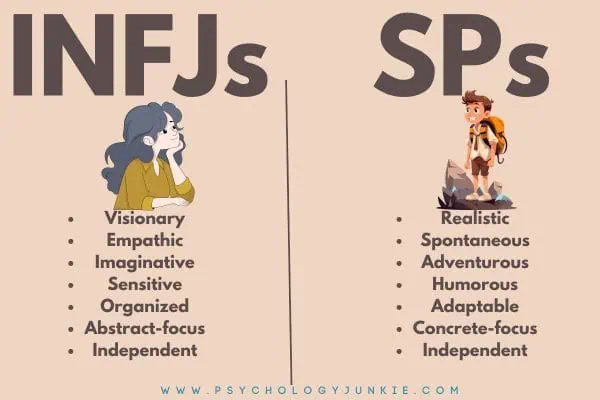
INFJs and Sensing-Perceivers can have a lot of fun and excitement in their relationships. They appreciate the SPs fun-loving, spontaneous nature. SP types usually have a strong physical presence and are full of action and energy. They hate doing anything the prescribed way, instead searching for freedom, variety, and real-life experience. The INFJ can really appreciate this because they tend to struggle more in this area. When they’re with a SP type, they may find that they take on more spontaneous challenges, go on more adventures, or feel more present in the beauty of the moment. In turn, SP types are often impressed by the INFJs strong use of intuition, an area where they are naturally weaker. INFJs love the playfulness, live-in-the-moment, laid-back style of the SPs. In turn, the SP types are inspired by the INFJs depth, passion, imagination, and insight. This often is an “opposites attract” type of relationship, where both partners admire the other’s strengths since it is usually an area of their own personal weakness. Someone with weak Sensing may admire someone with strong Sensing. Someone with weak Intuition might admire someone with strong Intuition, etc,.
The Struggles:
Usually, the major problems with the SP/INFJ relationships have to do with the N/S difference. SP types often have little interest in talking about long-term plans and insights, instead preferring to trust their senses. While INFJs adore the abstract and theoretical, SPs are extremely concrete and practical. SPs, more than any other type, live completely in the moment. INFJs live with their thoughts veering towards the future. INFJs live in their heads, SPs live fully in their bodies – taking in every sensation and being very aware of external stimuli. For this reason, the SP can often see the INFJ as having their head in the clouds or being flighty and unrealistic. The INFJ, in turn, can see the SP type as not thinking deeply enough, or being too focused on the here-and-now without regard to the bigger picture.
INFJs and ESFPs
This relationship is not for the faint of heart. Each of these individuals will challenge the other in ways that can seem scary or overwhelming, but that can be a good thing. INFJs challenge ESFPs to slow down and look ahead, and ESFPs challenge INFJs to trust their impulses and take more action. INFJs bring warmth and imagination to the relationship, while ESFPs bring excitement and practicality. Together they can do nearly anything, but they’re also likely to have a fair share of conflicts. It can be easy for them to feel “triggered” by each other because both will be strong in areas where the other is weak. These types need to be careful that they don’t get condescending and overly-critical with each other. INFJs tend to see Sensing as less important than Intuition, and ESFPs see Intuition as less important than Sensing. Because of this, they may perpetually misunderstand why the other is prioritizing the things that they do. A deep understanding of personality type can help these two to bridge misunderstandings and differences and grow closer in the process.
INFJs and ESTPs
If you like an exciting challenge, then this relationship is the one for you. INFJs and ESTPs look like opposites at first glance, but they actually share all of the same cognitive functions in the reverse order. This means that even though they may have different lifestyle preferences, they seem to innately understand each other in many of life’s situations. ESTPs energize and motivate INFJs, while INFJs help ESTPs slow down and see the bigger picture. Both types can create a lot of balance for the other if they are willing to appreciate each other’s differences without getting irritated by them.
Pairs in this relationship need to look out for condescension. Because both types are strong in areas where the other is weak, it can be natural to think that the other person is causing problems when they’re really only doing things according to their natural type. You can find out more details about this in my article, Why INFJs and ESTPs Fall in Love.
INFJs and ISFPs
Depth and creativity are at the heart of this relationship pairing. While this pairing is rarer than many, it is by no means for lack of passion. ISFPs help INFJs to probe deeper into their personal values and feelings. They also help them to see the beauty and joy in the physical details of life. INFJs help ISFPs to tap into their intuition and see hidden meanings and possibilities. Both types naturally respect each other’s space, but tension can build when they don’t respect each other’s feeling preferences. ISFPs tend to dwell on their feelings privately for a while before wanting to discuss them. INFJs are more likely to want to deal with feelings and emotions quickly. INFJs can be pushy with ISFPs about having open, transparent conversations, and ISFPs can feel that INFJs are too concerned with everyone else’s feelings and not as in touch with their own. An understanding of the differences between Fe and Fi can help these types overcome many of their relationship obstacles.
INFJs and ISTPs
Surprisingly, this romantic pairing is fairly common. INFJs and ISTPs are drawn to each other because they have enough similarities to make things comfortable, yet enough differences to make life exciting. Both respect each other’s privacy and need for space and both have strengths where the other has weaknesses. INFJs bring emotional understanding and visionary insight into the relationship, while ISTPs bring practical knowledge and a sense of adventure to the union. Both types find the differences in their partner intriguing and sexy, and since they share the same cognitive functions there’s less cause for misunderstanding as in many other relationship pairings. That said, these relationships aren’t conflict-free. INFJs like a lot of transparency and emotional connection, whereas ISTPs tend to be more reserved about such things. In the same way, ISTPs like straightforward, direct communication and INFJs are natural “sugarcoaters.” There can be conflict when the ISTP inadvertently hurts the INFJs feelings by being too direct or the INFJ becomes passive-aggressive rather than expressing their frustrations directly.
INFJs and Idealists (NF Types) in Relationships:
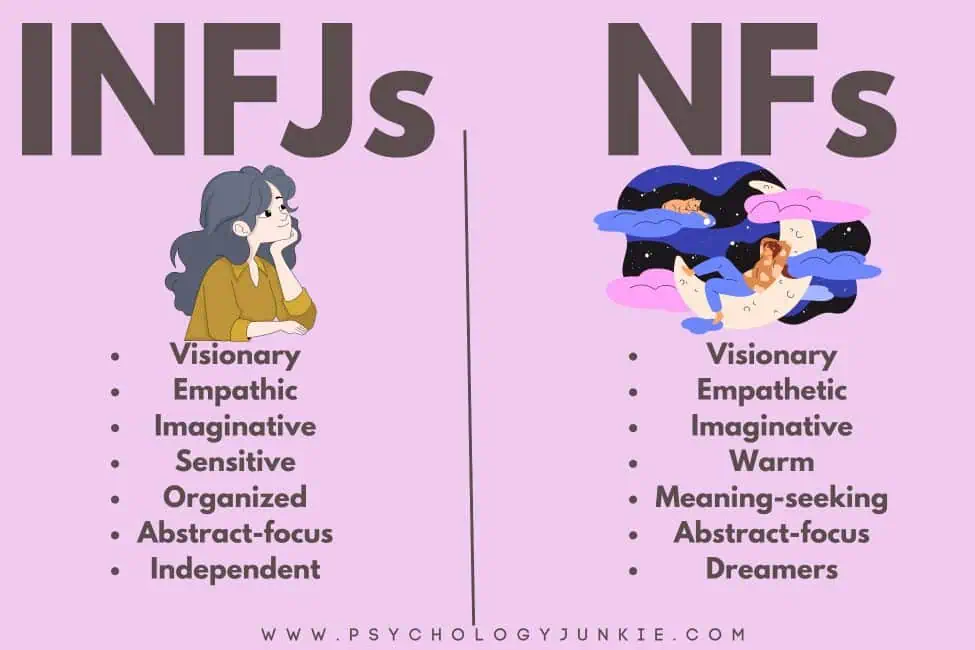
INFJs do exceptionally well with other idealists. While many types struggle with relationships within their own temperament, INFJs often find that true soulmate with another NF type. In fact, in a survey I conducted about type and compatibility, ENFJs and INFPs were the two types who got the most votes for ideal INFJ partner (by INFJ voters). Two NF types together can find deep satisfaction because they are finally able to be with someone who truly understands them, which is usually such an elusive thing for an INFJ to find. They will enjoy sharing their inner worlds with each other and will take very good care of each other’s emotional needs. They usually have very intense, romantic, intimate relationships that may feel “too good to be true.”
The Struggles:
Unfortunately, no relationship is without its struggles – and this definitely applies to the INFJ/NF relationship. An INFJ and another NF type may be so concerned with each other’s feelings that they risk invading each other’s personal space. INFJs are private and need a lot of autonomy to thrive, so after a while they may feel a need to get away and have some of their space back. They can have the same effect on the other NF type in the relationship. The other problem area is that they are both bound to be so intensely passionate about their visions and goals that they run the risk of tiring each other out. INFJs and other NFs are also not known for being particularly good with practical affairs, which can end up causing difficulties throughout their relationship. Especially if one partner takes on the bulk of the practical work out of concern for the other and winds up resenting them as a result.
Sometimes the differences that partners have can provide a balancing/relieving effect to each other. For example, if a feeler is getting carried away with their emotions, a thinker can help ground them. If a thinking type is being too tactless in their relationships, a feeling type can help them to find ways to re-word things. Two types in a relationship who share the same temperament may end up “living in a bubble,” becoming too focused on a narrow perspective of life and how things should be done.
INFJs and ENFPs
Ideas will abound in this exciting relationship. ENFPs will bring the options, alternatives, and breadth of ideas, whereas INFJs will bring a probing, deep insight into one or two ideas. There’s usually a quick spark between these two because, while they’re both very similar in some ways – they use each of their strengths in a totally different way. INFJs and ENFPs are both intuitive-dominant types, but while ENFPs will constantly generate more ideas, INFJs will constantly be narrowing them down to find the best fit. ENFPs will focus on alignment with their inner values, while INFJs will be social chameleons – wearing their hearts on their sleeves and focusing on the moods and feelings of others. ENFPs can broaden the INFJs perspective on life, while INFJs can help ENFPs to narrow their focus and dig deeper. These two will go on lots of adventures, both physically and mentally – each one sparking brighter, more vivid insights in the other. There might be some misunderstandings and arguments because they share none of the same cognitive functions, but because of that, they can both help each other to grow in powerful ways.
INFJs and INFPs
Depth and imagination run wild in this powerful relationship. While these types share none of the same cognitive functions, they share many of the same values. Both thrive in quiet atmospheres and enjoy focusing on imagination and possibility more than surface-level details. INFPs can help INFJs to deep-dive into their feelings and find out what really matters to them on a personal level. INFJs can help INFPs to find a focus and direction for all their creative energy. Problems can arise in this relationship when INFJs see INFPs as too caught up in their own feelings or too hard to read, and INFPs feel that INFJs are “people-pleasers.”. By developing an understanding of each other’s cognitive functions, the two can have a much more understanding relationship.
INFJs and ENFJs
Passion runs rampant in this dynamic, emotionally-rich relationship. INFJs and ENFJs have so much in common that they will naturally have a deep understanding of each other. In fact, they may get so caught up in “reading” each other that they get their emotions mixed up in the process. It’s common for these pairs to struggle with differentiating their own feelings because their empathy runs so high. Driven and organized, both of these types will enjoy envisioning and achieving goals. Together they can be an unstoppable force, working with people and projects to inspire change in the world. However, they need to work on slowing down sometimes and taking care of their own physical needs. Both of these types tend to downplay the importance of adequate rest, nutrition, and other health requirements. Being aware of this can help them to keep those important aspects of life on their radar.
INFJs and INFJs
Kindred spirits, INFJs and INFJs will naturally be drawn to each other for their shared empathy and global view of life. That said, so much similarity can be too much of a good thing and this combination can find themselves stuck in a “bubble” of stagnancy if they’re not careful. They may enable each other in their weaknesses or find themselves bored by so much similarity. However, they can also motivate each other in their strengths and work through misunderstandings quickly. There will be plenty of transparent, authentic conversation here, as well as respect for each other’s space. Many evenings will be spent reading books on the couch or discussing the meaning of life. These two just need to be careful not to stump each other’s growth by ignoring their shared weaknesses.
INFJs and Rationals (NT Types) in Relationships:
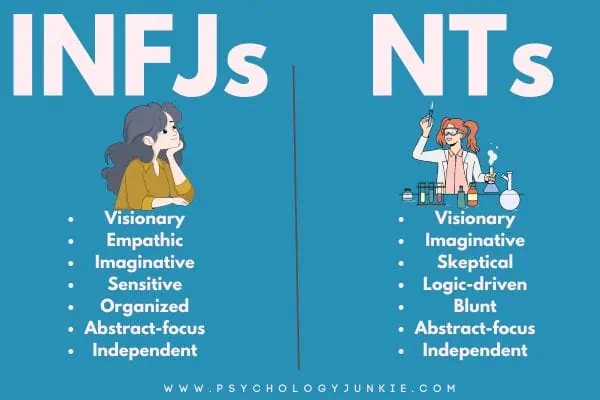
The INFJ/Rational match is considered by many MBTI® experts to be the best pairing. In the rational partner, the INFJ can find someone who, like them, thinks in abstract terms, who sees the world of possibilities, ideas, and theoretical concepts. Yet, unlike another NF, the NT has a certain autonomy and logic-driven focus that the NF finds to be intriguing and balancing. The NT type will likely see in the INFJ a warmth, passion, and sincerity that they admire and desire. Conversely, for the NF type, they see the NT type as being curious, intellectually stimulating, and brimming with ideas that are inspirational and fascinating. These two types together can engage each other’s intuition and ideas and can be an unstoppable force for innovation and brilliance. David Kiersey says that the best match for the INFJ out of all 16 types is the ENTP. He says:
“The reserved and schedule-minded Counselors (INFJs), with their complex, mysterious, symbolic inner-worlds, tend to become trapped by introspection and tied in ethical knots, and they can be freed up considerably by the outgoing and probing Inventors (ENTPs). Counselors might also find great satisfaction in trying to help the non-conformist, sometimes even reckless Inventors find their soul and significance in the scheme of things.”
In our survey of INFJs, INTJs were the NT type that most considered ideal. This also makes sense since INTJs are Introverted Intuitives just like INFJs and have the same dominant and inferior functions. You can find out more about that here.
The Struggles:
Of course, there are always potential problem areas for any pairing. With this duo, the problems mainly lie in the T/F (Thinking/Feeling) difference. The INFJ’s firm belief in their intuition may exasperate the ever logical NT types. The INFJ may also feel that the NT types lack sensitivity or depth of concern for humanitarian issues. The NT type may find the INFJ overly absorbed in their feelings or in other people’s feelings and may wish for more of a logic-first approach at times. However, if both types work to stay balanced and healthy and try their best to understand each other, this pairing can be incredibly successful.
INFJs and ENTPs
Chemistry runs high in this powerhouse relationship. Both INFJs and ENTPs share the same decision-making functions, Introverted Thinking, and Extraverted Feeling. Because of this, they will both value precise logic and open, transparent communication and shared feelings. ENTPs will tantalize INFJs with their never-ending list of ideas and experiences, and INFJs will draw ENTPs in with their warmth and imagination. Psychologist David Keirsey suggested that this was the most ideal match for both of these types.
INFJs and INTPs
Often called the “Golden pair,” INFJs and INTPs find each other intriguing yet comfortable to be with. Used to being perceived as misfits, together they can escape into the solace of their quiet, introverted world. Exploring ideas and theories in-depth will give them both a rush, and many nights will be spent reading books, debating concepts, and refining each other’s perspectives on life. INTPs can help INFJs to refine their accuracy and logic, whereas INFJs can help INTPs to refine their understanding of the emotional world and human dynamics. Problems can arise in this relationship when the INTP‘s more laid-back way of life interferes with the INFJs perfectionism and vice versa. You can find out more about this duo in my article, Why INFJs and INTPs Fall for Each Other.
INFJs and ENTJs
This relationship can either be a very good or a very bad idea. Both of these types are visionary, future-focused, and strategic. Both enjoy having a plan and structure for life. However, while ENTJs are decisive, straightforward types, INFJs tend to be more introspective and slow to come to conclusions. INFJs can find ENTJs intimidating or overly-forceful, while ENTJs can find INFJs too wishy-washy or sensitive. These relationships often find more harmony in later life when ENTJs get more in touch with their feeling side and INFJs get more in touch with their thinking side. However, in the early years, there can be a lot of conflicts if neither one is willing to understand the other’s perspective. Either way, when these types work together they can motivate the other to achieve far-reaching, groundbreaking goals.
INFJs and INTJs
This relationship is bound to be both intense and meaningful. Both of these types look for grand patterns, connections, and possibilities. Both are drawn to the abstract and theoretical more than surface-level realities. However, where INFJs make decisions based on the dynamics and needs of the people around them, INTJs will make decisions by weighing the pros and cons and looking at the logical facts. This can lead to conflict when both types reach an impasse on a decision. However, during these times they can help each other to grow and see outside themselves to make better decisions. INFJs can help INTJs to take other people’s needs into account and INTJs can help INFJs to see a more straightforward, logical approach to problem-solving. This can be a relationship with a few conflicts, but it can also be one of tremendous growth and fulfillment. You can find out a lot more about this relationship here: Your Guide to the INFJ and INTJ Relationship.

INFJ Strengths in Relationships:
- Good listeners
- Warm and empathetic
- Sincere and authentic
- Open-minded and imaginative
- Protective of their partner’s feelings
- Have very high expectations of themselves (both a strength and a weakness)
- Take their commitments seriously
- Excellent communication skills, particularly in writing.
INFJ Weaknesses in Relationships:
- Very private. They can keep part of themselves hidden.
- Detest conflict or criticism
- Not usually good with practical day-to-day matters or finances
- Can hold their partners and themselves to an unrealistic standard
- Can have a very hard time leaving a bad relationship
What are your thoughts?
Are you an INFJ with some insights into relationships and MBTI compatibility? Are you a different type with any thoughts? Let me know what you think in the comments! I’d love to hear from you.
Find out more about your personality type in our eBook, The INFJ: Understanding the Mystic
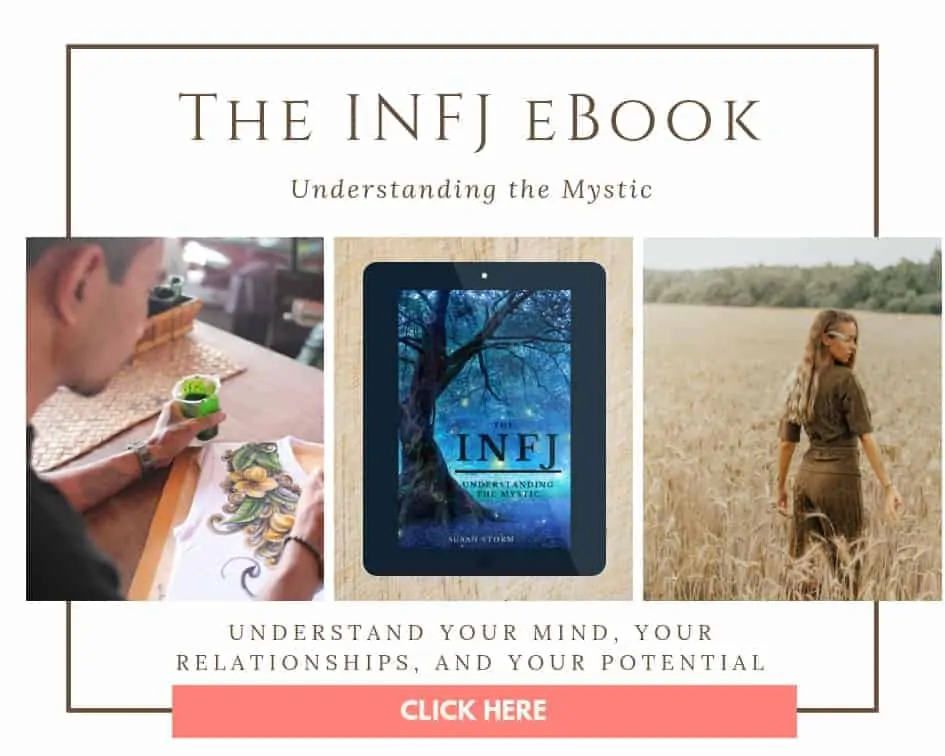
Sources:
I wouldn’t be able to get very far without the help of these AMAZING books and web pages. If you want to know more about the INFJ, the other MBTI® types, or relationships, check out the sources for this post.
Please Understand Me II by David Kiersey
Just Your Type – Create the Relationship You’ve Always Wanted Using the Secrets of Personality Type by Paul D. Tieger
Personality Page – INFJ Relationships
Personality Junkie – INFJ Relationships (AWESOME web site!)
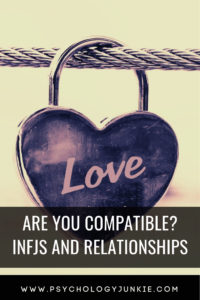
Get Your Free INFJ eBook
As a thank you for subscribing to my newsletter I will send you this free eBook PACKED with self-care tips, creativity hacks, and more! You'll also get a 3-day email course for understanding your personality type better!


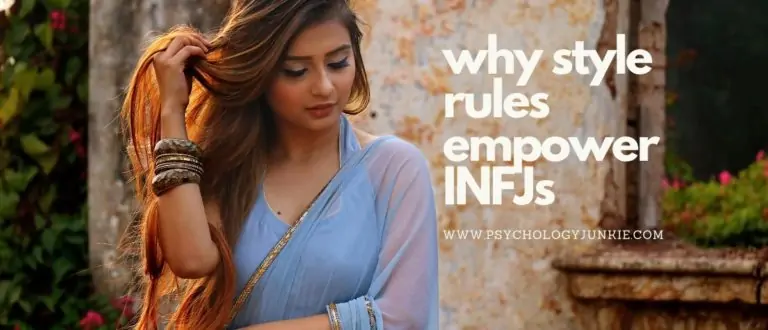
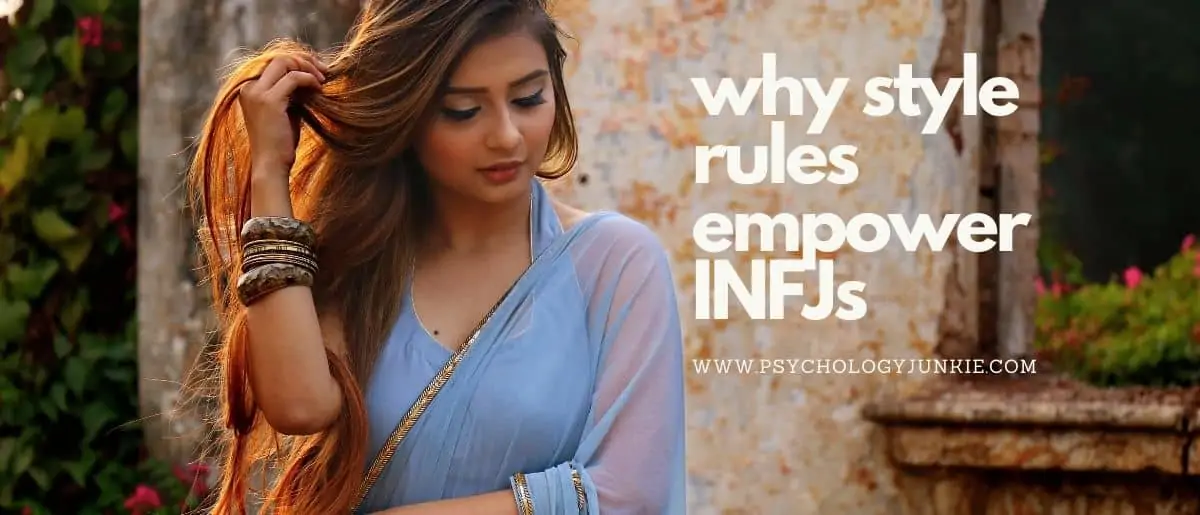
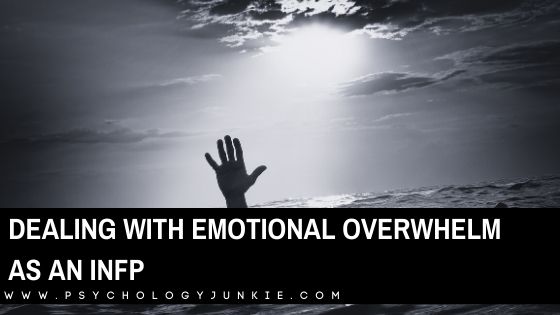





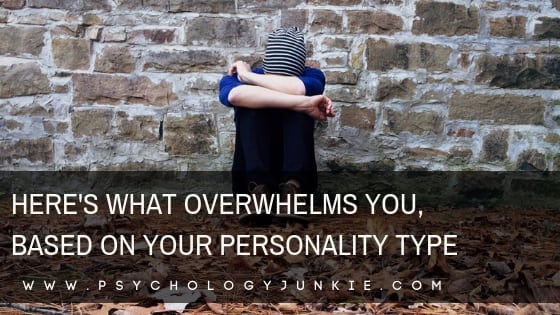
Love this post! I am an INFJ and my boyfriend is an INTP. I find that we are both sensitive people and can connect on a very deep level. But his thinking nature helps me to balance my feeling nature, which can get extremely overwhelming! As an introvert I find the dating process to be extremely nerve-wracking, so I’m glad we are at the part of our relationship where we know and trust each other well.
I enjoyed this post so much! Haven’t been in a serious romantic relationship yet, but I’ve found what you’ve written to be true in the types of people I find myself attracted to and who I’ve formed friendships with.
The more I read about MBTI types and relationships, the more I’ve tried to get away from the idea of searching for someone who is my “ideal/perfect” type. I’m more focused on shared faith and good communication now — if we have a similar worldview and belief system, and I feel safe talking with them, then it doesn’t matter so much what their personality type is. I’ll admit I still have some “favorite types,” but I’m trying to not let that influence me so much.
Never understood why so many people think INFJs and ISTPs aren’t compatible — we share all the same functions, just in a different order. Nice to hear from someone that the relationship can work out 🙂 I think Isabel Meyer was an intuitive happily married to a sensor (INFP and ISTJ if I remember correctly), so even the woman who created MBTI and said Intuitives are most compatible with other Intuitives found that wasn’t the case in her marriage.
Hi Marissa! Thanks so much for the encouragement. I really appreciate it! I always feel so under-qualified to give out ANY kind of relationship advice that I feel a little sheepish posting these kinds of things. That’s why I gather so much from books and other sources, and try to put my own spin on it.
I definitely feel that people use the MBTI to a fault sometimes when it comes to relationships, and they start becoming unsatisfied in their marriages or relationships because that person isn’t “compatible” based on some chart or on something they read in a book. Like you, I think faith and similar goals and worldviews are extremely important. Way more important than being a sensor or an intuitive, an introvert or an extrovert. I basically use the MBTI to try to UNDERSTAND people better, not to try to find reasons to create barriers or anything like that. Of course we have the people who just get us better or conversation flows more smoothly with. Overall, I do believe that God is in charge of who we’ll marry or end up with…speaking of which, I hope when you do get into a serious relationship, that person is AMAZING 🙂
Thanks again for the comment! It’s so fun to talk about this with other people who know so much about the subject 🙂
Thanks for the comment! I think INTPs and INFJs are an awesome match 🙂 Have you ever heard of the book ‘Just My Type’ by … can’t remember the name now, sorry (and if I wasn’t in bed I’d go find it!) Anyway, it goes through each type and how well they are compatible with each other type. If you’re interested I can look up the section on INFJ/INTP and send it to you or something. It’s a pretty helpful book. It sounds like you guys have a really good relationship, though, so you probably don’t even need it! I HATED the dating scene….so glad I’m out of that now. Modern dating is crazy…
That sounds like an a awesome book, I would love to read that section! And it really is, it’s quite an overwhelming scene!
Hey Susan!
Another INFJ here. Im very keen on the topic and I have to say that your post is awesome: you made it both complete and very clear for people to understand it and rise interest about personality types. I just discovered mbtijunkie and Im really looking forward reading more from you.
In exchange I will leave you here two of my favourite books about the topic. If you didnt read them still, give it a chance 😉
http://www.amazon.com/Not-Crazy-Just-You-Personality/dp/185788552X/ref=sr_1_1?ie=UTF8&qid=1445892557&sr=8-1&keywords=im+not+crazy+im+just+not+you
http://www.amazon.com/Gifts-Differing-Understanding-Personality-Type/dp/089106074X/ref=sr_1_1?s=books&ie=UTF8&qid=1445892887&sr=1-1&keywords=gifts+differing
Regards!
Thank you!! I love the Gifts Differing book, and the other one I haven’t read, so I will have to check that out! I appreciate your feedback and encouragement. Its always nice to know I’m not completely off base 🙂
Per usual (which means very good in INTJ) you have once again landed spot on. Living with an INFJ/P (she is of two minds) is at times a challenge. I often find her level of commitment overwhelming since it is based mostly on intuition versus logic. However she is often thoughtful and protective making for warmth. I think this was a great piece for you to do since you have first hand insight. Plus your guidance always comes with the recommendation to grow. Which is always advisable! Great work and writing.
Per usual (which means very good in INTJ) you have once again landed spot on. Living with an INFJ/P (she is of two minds) is at times a challenge. I often find her level of commitment overwhelming since it is based mostly on intuition versus logic. However she is often thoughtful and protective making for warmth. I think this was a great piece for you to do since you have first hand insight. Plus your guidance always comes with the recommendation to grow. Which is always advisable! Great work and writing.
Thank you! I am glad you are enjoying some of the benefits of a relationship with an INFJ! I know we can be kind of crazy sometimes:) I do think the INTJ/INFJ pairing can be really good! My sister-in-law is an INTJ and we have GREAT conversations 🙂 Thanks again for the encouragement! I always appreciate it.
So funny. I am an INFJ married nearly 30 years to an ISTP WHO DRIVES ME COMPLETELY BATTY sometimes. Thankfully his S is borderline N so we do actually share some of that, but your article hits home in many ways. We make each other grow, to say the least.
There seem to be a lot of INFJs married to ISTPs! There must be something about the two that attracts each other 🙂 We are definitely very different and I think we can drive each other very crazy (my husband wants me to relax and go with the flow more, and I want to have deeper, more theoretical discussions more often). We still have a lot of fun though, and I admire what makes him different. I know there are some days we both make each other a little crazy though! Thanks for commenting! Very fun to hear from another INFJ in an ISTP relationship!
Enjoyed this post, thanks. My husband of almost 20 years is ISTP and I’m INFJ. We also have a great relationship 🙂
Thank you! I’m so glad you enjoyed it!! The INFJ/ISTP relationship seems to be really common! There must be something really special between these two when they’re together 🙂
I just found out I’m a INFJ today and it was such an eye opener. I’ve always felt conflicted, generally very emotionally overloaded and confused as to what I was really feeling . I also found I had a very unrealistic view that every one experienced and expressed love in the same capacity as myself . My sons father and I have been having relationship problems since we found out I was pregnant and moved in together . We also just found he is ISTP today . For the last two years I truly believed I was living with an emotionless , shallow , ignorant , adrenaline junkie , Jerk face to put it nicely . This completely clashed with all the good qualities he constantly displayed to me . I couldn’t figure out how this man could tell me he loved me but show so little interest in having a deep connecting conversation with me and be so dismissive of my emotional turmoil. We would get along fine for weeks and inevitably he would do something that was inconsiderate of my feelings . This would cause a huge fight , where he would shut down and I would go on uselessly about how you were supposed to treat people you loved based on my ideals . After learning our personality types , I now have a greater understanding of my guy and myself . Every fight we have had as been a HUGE misunderstanding of how the other thinks and reacts to different situations . Everything I read up to this article has made it seem that INFJ / ISTP cant get along or work things out . Your article has given me hope that we can take these personality profiles and learn how to work together to ensure both our need are met to a satisfying level on both sides . I am very happy at being disillusioned with my views of love , as it means that neither of us are wrong we just view things differently . His love is no less then mine because he expresses it differently than I expect . Thank you for sharing this , and giving me hope . If we don’t work out we can still part on good terms knowing we tried everything and in the end it was our differences not our faults that divided us . I’ll feel completely satisfied and at peace now no matter the out come
Thank you so much for commenting on this! I really do think there must be something special between INFJs and ISTPs because out of all the relationship pairings I hear from the most, this is by far the most common! I think it’s safe to say it may be because we share the same functions, just in a different order. There’s a sense of ‘getting’ each other, but yet…not quite. It’s like we’re opposites, but there’s something there – a similar tie. If you think about it, in your 30’s you develop your tertiary function, which for an INFJ is Ti (Introverted Thinking). IN his 30’s he’ll be developing Ni (Introverted Intuition). Ti is his dominant function and Ni is your dominant function. I feel that a lot of ISTP/INFJ relationships tend to blossom more in middle age because of this – it’s just a theory of course, but it would make sense to me. Also, Ti is your relief function, while Ni is his relief function – so there’s something kind of balancing about being together in a relationship. Yet it can still be rough because we are very different types! I am so glad you feel at peace and happy in your relationship now. INFJs and ISTPs do show love very, very differently – but they are each incredibly special, wonderful types. My ISTP husband is incredibly loving, but sometimes I’ll think ‘wow, that was thoughtless’ but then I realize it wasn’t – it just wasn’t the way I would have done things. I’ve realized my way isn’t the right way, it’s just different. Some times of course, his way or my way is right depending on the situation. Anyway, I’m really glad this helped and I wish you the best of luck in your relationship – I do hope it goes well!!
Thanks Susan for the eye opening and precise message. I am an INFJ(Still looking for more of them in my homeland Kenya) discovered two years ago. When was preparing to get married to my wonderful husband.
I sort of type people through our interaction however brief the encounter may be. I type him ISFP.(This is a cousin to your ISTP). I tend to “see” his S. He is far practical while am idealist and keep going with flow keeping his options open while I like to close on my opens and move to implement precisely and with minimal alterations if any.
He balanced me on J/P but definitely our N/S clash is working in progress. Whoever told INFJ everything is for improvement. But I sure thank God for the wonderful man he is.
I really feel compelled to share my experience of the INFJ/ISTP pairing after seeing all the comments in favour of it! I’m a 20-something INFJ who’s been seeing my 30-something ISTP boyfriend for almost seven years. Originally I thought that I was an INFP and that he was an INTJ due to those online personality tests, which I now know can tend to mistype individuals, particularly introverts. Now that I have a better understanding of cognitive functions, I was able to see how I’m really an INFJ, and was able to help him determine that he is an ISTP. And now it’s suddenly like everything makes sense in the way our relationship has been! Sadly, our relationship has been prone to repeated break ups and make ups in the last two years due to poor communication that just got worse and worse with mounting resentment. But now I can see what’s perhaps the reason we were attracted to each other in the first place, and perhaps keep making up: I admire his Se which is my weak point, while he admires my Fe which is his weak point, and thus we subconsciously chose each other for these reasons. So clearly the demonstration of ‘opposites attract’ at work! This weekend we really took the time to understand our personalities and now I can see where his source of frustration with me stems from, and vice versa. It’s really like the light finally came on in the room! Now I’m hoping that with better practice of calm communication to manage conflict better, as well as understanding each other better and accepting each other for who we are instead of staying firmly planted in our own ideas of how we should both behave, we can regain some stability to our otherwise fun, light, and easy-going relationship. I’m so happy to know though, Susan, that it is possible for an INFJ/ISTP relationship to work! I wish continued blessings and happiness for you and your husband 🙂
Thank you, Susan for the great article. I’m an INFJ and reading this made me tear up. I’m not sure which personality type my husband is. Can’t get him to take the test. We get along great and have a wonderful marriage so I will be happy with that.
I would say that this is quite correct when it comes to interraction with other types. I am an INFJ female. I have two male ENTP-friends and a male ENFP-friend. The ENFP is a passionate idealist who feels deeply about his ideas and enforces them with conviction, but he does not always understand exactly how to convince others, I think, because he is too relentless: we often discuss, and I think I manage to get him to see another angle of things, which can help him to convince advisories better and realize that this is actually necessary to accomplish things. I always feel like an equal with him, and we do have a great chemistry. I think we balance each other way, complement each other. The ENTPs stimulate me much intellectually: I don’t council them in the same way as I do with the ENFP, but we discuss and inspire each other, and I have a feeling that they respect me in a different way; that they respect my intuition even though they don’t function like that themselves, and that we have some sort of understanding bond.
I also have two friends being ISFP and ISFJ! (both male) Our interaction is really very uncomplicated and smooth with continuous harmony and no arguments despite several years of relationship. Very calm and relaxing.
Thanks so much for sharing your experience and feedback! It’s always very interesting to me to see how the different types get along and how they enjoy each other’s company. I firmly believe that any type can get along with any type, there are just different challenges along the way and some types will ‘get’ each other more quickly and more deeply than others will initially. Thanks again for sharing!
Hey, Susan!
I absolutely loved your post! Coincidentally, I am an INFJ and my husband is an ISFP! 😀 Our relationship was pretty bumpy at first, but we blame this on the fact that we were very young (we started dating in high-school, got married after 13 years together). Now, it’s simply amazing! I know that the best type for me would be an ESFP and for him, an ENFJ, but honestly, we wouldn’t even imagine a life with an extraverted person, so we’re pretty happy the way we are 🙂
Thanks for the post, it was really like reading my own soul, when I read the post 🙂
Raluca
Thank you so much Raluca! I’m so glad you found it encouraging! That is so cool about your husband and you being high-school sweethearts 🙂 Every single couple I know that started out as high school sweethearts has done SO well together. I’ve also been curious how the ISFP and INFJ relationship works out! It seems like it would definitely be a complimentary pairing in a lot of ways.
Again, thank you for the encouragement and for reading my blog! It’s always fun to read other INFJ’s experiences 🙂
Thanks for this post, and the blog in general! I am an INFJ and I dated an ISTP for three intense months and all I can say is “Where is my ‘I Survived’ t-shirt?!” Haha. You are very fortunate to have found an ISTP that respects S/N difference and saw it as a strength rather than a weakness.
In my experience, the novelty of opposites was so amazing and I could see very clearly everything that the two of you experience as you described it; however my ISTP wasn’t convinced and broke it off out of the blue (ok..not really out of the blue– my Ni could feel something coming but I couldn’t figure out why or when in the moment). He’d decided that it (the S/N) was the reason we couldn’t be together, and even when I did figure out what was happening and why (he was in the grip due to work stress and we were spending way too much time together), his mind was already made up and his inferior Fe turned him into what I could only describe as an “emotional terrorist”. It was devastating because I couldn’t protect myself, I was so hurt. A while later I guess he turned back into a human (LOL!) and reached out to me (which I also saw coming but hoped he wouldn’t actually do), but by then I had finally moved on (I felt so sick for a long time, but I made it through). I learned sooo much from the experience on how to respect my delicate Se and not overuse my Ti, and also to not apologize for how my Ni and Fe work, which he’d criticized. I spend a lot of time working on strengthening my Fe and building much needed boundaries and more awareness of my own feelings; I can’t imagine getting involved in something like that ever again, so I’m definitely grateful for the experience.
Anyways, after healing I serendipitously met an INTJ and now I couldn’t be happier! Spending time with an Ni dominant is like being lost in the Bermuda Triangle, finding a piece of me I never knew I lost and never wanting to leave, haha! We just have our own little Ni island in our heads, away from everything. It’s so funny because I have dated a lot of the different types and I have never felt so in sync with someone until the INTJ. Seriously Leveled Up! We are either spending hours mind-melding about complex issues (world peace, long lines at the grocery store, the usual stuff lol), or just enjoying a peaceful silence just so happy to have another person around who “gets it”. The question “Where have you been all this time?!” often pops into our heads when we converse.
I do agree with the sentiment though that it really depends on who the person is, their goals and needs in life, and not just their type. If you both want to make it work and are willing to try, no matter the type it will be just fine 🙂
I’m an INFJ and been married to an ISTP for going on 13 years and this is my perspective on my ISTP man. 🙂 I was only 18 when we met and his calm directness and (for lack of a better word) quiet dominance, is the initial thing that drew me to him. We are both over 90% introverted but our N/S, T/F, /J/P are as opposite as you can get. For example, during our renovation, we had trouble with the hot water not coming out of the shower and one day I walked in to find the shower faucet in about 20 pieces. Like, tiny tiny little pieces. There was nothing written down, nothing in any order of how it went or anything. I said, (in my moment of panic at his lack of forethought on the process) “You’re never going to remember how to put all that back together!” He just laughed, and a few days later, our faucet worked. Sometimes it takes him a while, but he can fix things that I would have otherwise thrown away or just replaced. When I would think about all the possible ways to do something, then do it, he just does it first, then adjusts whatever he needs to in order to fix it.
I love that he is my “grounder” when I feel like my emotions are going to explode. If I think I am bringing too much emotion into a situation, I’ll ask his opinion and yes, most of the time, he does the are-you-serious-look and tells me yes in his sarcastic/slightly funny way. He makes me laugh and roll my eyes at the same time. It does get frustrating sometimes when it appears that he doesn’t care about things as much as I do, but I’ve known him long enough to know that’s not always the case, he just has different reactions to things than I do. Sometimes, if I talk too much for him to process, he will start to verbally shut down, but he is still listening and absorbing everything. I have learned that he may not be able to repeat things word for word, but he gets the overall aspects of what I have said. I have also found he is capable of understanding if a situation needs more emotion, he just can’t express it the same way. I seem to get myself into too many stressful situations because I want to help people. I rarely if ever say no, no matter how overloaded I am if I think I can help someone, so I have learned to first ask his opinion on it because he can easily gauge whether or not it will burn me out. Neither of us like conflict, so any issues are dealt with quickly.
One thing I have always found interesting about us is, I have an aversion to touch from pretty much anyone, except him (and our kids). Like, I don’t do hugging, or rarely shake hands unless it would hurt someone’s feelings not to do so. I fear social situations where this is the socially acceptable thing to do (weddings, funerals, family reunions). My husband has the body language of a sniper and people literally just do not approach him, except maybe for a simple, quick hand shake. It makes me envy him lol. I have a few family members who like bear hugs, and that seriously makes me cringe just thinking about it. But, it’s almost like I crave touch from my simple yet complex ISTP, like some form of touch addict. I would LOVE feedback on this because I am seriously starting to wonder if that’s a normal reaction to his type or if it’s just me. (The image of myself cautiously approaching a leopard, and being shocked and secretly pleased when it lets me touch, comes to mind.) Don’t get me wrong, my husband isn’t really a dangerous type man. He wasn’t military or police and his day job isn’t particularly dangerous, but those things don’t seem to matter. It’s how he holds himself. He is so together, and I am so…NOT. But I do feel my tension and anxiety start to dissipate as soon as we have any physical contact.
I will say that, with regard to the image that an ISTP will get bored and move on because they don’t like commitments, it is something that I have often worried over. When I say this to him, he just says, “I won’t ever get bored with you, you’re like multiple people in the same body. It’s like a 2-for-1 deal.” And as usual, he has a sarcastic yet funny comeback that puts my mind at ease for at least 5 minutes. 😛
Our biggest issues are usually emotion based but they get better every day. I will say that I am more dependant on him than he is on me. I feel like the more clingy person, which he doesn’t seem to mind as long as his needs are being met. He drives me insane a lot but he makes me feel normal a lot too. Which is of course a HUGE deal to me. It really is a sort of 50/50 type relationship for us most days, but then there are days where it’s 100/100 and those are the days it is so worth it to be with an ISTP. 🙂
B,
I loved reading your comment! I have been with an ISTP for a year and a half (it feels like so much longer though, in a good way), and reading this post as well as your comment give me so much hope. My ISTP and I have been learning so much about each other since I’ve started to really dig into what it means to be an INFJ. I’ve never felt a connection with anyone like I do with him, but we have definitely hit several road blocks that scared me. Oh, also we met in CO, but he had to move to MD last December for work; that adds another layer of complexity to the whole thing! Your info helps! And what you mentioned about your husband saying he’ll never get bored with you made me laugh, because it sounds exactly like something my ISTP would say to me. I have a question for you: You are able to claim that you know you are clingy-er than he, but doesn’t that ever bother you? How did you get to be alright with it? I often deal with that, and get to feeling like maybe it means he doesn’t love me as much as I him. He and that tiny voice of reason tell me that I know that isn’t the case. But my emotions which of course win over tell me to feel bad about it.
I have read on this Website – http://www.misterp.ink/wp-content/uploads/2016/04/INFJ-Infographic1.jpg – that the INFJs are “romantics with dirty minds”. Is it true? How is considered our sexual lives?
I am an INFJ and my husband is ENTP. I truly feel like we are soulmates. We feel such a deep connection to each other and talk about that regularly, which in turn deepens the connection. When we first started dating, I didn’t actually think we were dating–it was just so fun, easy, and effortless! He’s my best friend and we talk about absolutely everything. I love that. Your article was right in that I find him to be very intellectually stimulating. You were also correct that he gets annoyed sometimes when I rely on my intuition. When I say I don’t care for a person I just met, he says I judge people too quickly. And I’m like, “Yeah, I’m INFJ–that’s what we do!” But anyway, 12 years later and we’re still head-over-heels for each other.
Alternately, I can’t imagine being with another Introvert (I’m ~60% introverted). I feel like I would get bored. I need to have someone pull me out of the house to do fun and exciting things. There are certainly times when I absolutely don’t want to be social and my husband is very understanding, but he’s also dragged me to some things that I never would have gone to otherwise. As they say, some of the best experiences happen outside of the comfort zone. (And if it wasn’t the best, it usually makes for a great story!)
Thanks for the article–it’s interesting to take a peek into other INFJ pairings.
I wouldn’t usually comment on something like this… but I felt like saying two things (ends up it’s three, but every essay needs a conclusion and a Very Snappy, Happily-Parenthesised Introduction). I am almost definitely an INFJ.
Firstly, in relation to ISTPs and INFJs… there was one site I read awhile back that said that INFJs [often] have a fantasy of being ISTPs (I could be wrong that it was ISTP, but I think I am not). I am curious if that would influence an INFJs desire to be with an ISTP if they met one. The thrill of at least being close to someone they respect and wish they could be like. But, I suppose, I can ask you if you find this to be so in yourself. I certainly have; reading that was very striking- a HA. YES. moment.
Secondly, my closest friend [thinks she] is an INTJ (I think so, too, consequently). What you said of INFJ-INTJ relationships makes sense in my experience. I seem to be quite a thinker, as well, and I love learning pretty much anything, so we get along very well, and learn from each other, and together about New Things. My mind conjures an image of Sherlock-Holmes-and-Watson-esque variety. It is probably true, if I am not as much a Thinker as she is, that I long after being that type of person, as well as wishing I were a bit of an adventurous risk-taker.
In what I’ve been reading on your site so far, INFJ really does explain the feeling I’ve had about my social life ever since I thought about what I felt. I find it hard to call someone a friend. Almost everyone I’ve met in more recent years is very liberal in labelling a person ‘friend’, which confuses me (only emotionally, not rationally) because I ‘feel’ they must have some valid reason for calling me ‘friend’, but I don’t see what they’re on about. I don’t easily respect people who call me ‘friend’ with Reckless Abandon, because they obviously can’t tell I don’t see it that way, and if they can’t tell that, then I’m not sure if they can tell anything else about me. But we’ll see. I will hold out for them in case the tides change. It is not my job to dictate the Future of Humanity.
(Now, for Amusement Purposes in case you comment back, I am curious if you can see in my writing what may be ISFJ and maybe, just maybe, ISTJ or INTJ tendencies. There are some descriptions of these other types that I identify with strongly, but only some, which… well… is a wonderful little puzzle that I’ve been ruminating over for six years or so. May be explained in being well-developed. May not.)
Omg thank you so much for this! I just started dating an SJ and was so shocked because I’ve always dated ENTPs (the intellectual compatibility didn’t make up for all the other crap I went through with them) and no one talks about INFJs and SJ’s except to discourage it. But everything you talked about perfectly expresses how I feel about it. Love your post!
I am an INFJ. I have only experienced two relationships. I consider myself lucky that I didn’t have to suffer through the vulnerability of dating! In high school I dated an ENTP who also happened to be a narcissist. We were together for almost three years and it was horrible. He knew exactly how to take advantage of my Fe and did so freely. I was afraid of being without a boyfriend back then, and was drawn to his charisma and popularity. Being with him made me feel less weird, I think, as if someone so liked and popular liking me meant that I was “normal” and “approved”. Because of this “social security” I overlooked his cheating and manipulative ways. Luckily I went out of the country for college and was able to gain distance and perspective. I became strong and independent and grew more comfortable with myself. As I become stronger, he could tell and started panicking as he could no longer control me. It was an amazing feeling to break up with him. Anyway, this was all necessary for me to learn exactly what NOT to look for. I took the time to figure out what I did and didn’t want from a relationship and was happily on my own for about a year and a half when I opened my eye to the love of my life: my darling INTJ!
My INTJ and I met in college and were studying the same major (English Literature), so had actually known each other for a couple of years. Funnily enough, I didn’t like him at first because he had ALL the answers to everything and was very intimidating in discussions due to his Te. I hated being in groups with him because I always preferred (and still do) to think on things before sharing. However, one fateful night six years ago we found ourselves in a one-on-one conversation in the student bar. We connected on such an unreal level I had no idea where it was coming from! It was amazing, the only way we could describe it was “the sublime.” We still refer to our connection as something of the sublime, because it really feels like something larger than just us, somehow; a true meeting of the minds, perhaps. We spent the whole weekend together in our “Ni dominant island” (as previously stated by another commenter), and it was like coming home when I didn’t even know I had been away. We still have the most fascinating conversations, which I think are highlighted by our Te/Fe. He ruminates about the way technology, government, education, space travel, etc. will change over time, and then I do the same but put it into the context of how it will affect and be affected by society. There is no one else with whom I feel comfortable going so deep into the waters of thought. We also complement one another because I add compassion to his life and he adds steady rationality to mine. Sometimes I get overwhelmed and caught up in crazy worst-case-scenarios that are so “out there” and I don’t know how I got there, and he listens and then brings me back down to earth by applying more external logic to my thoughts. I’ve also been learning how to do this and it is such a weight off my chest (and mind!).
I could go on forever, really. I love your website. I’ve learned so much about myself and others, so thank you. And also, I do think that if the functions are balanced well, INFJ/INTJ are a fantastic pairing. And, as my future mother-in-law says, “A force to be reckoned with” 😀
Hi, I’m an INFJ in a relationship with an INTJ for 3 and a half years now.
I think we are a very good fit for all of the reasons that were already stated but I do struggle “accepting” his lack of tact and the fact that he is not able to understand my feelings and adjust his actions and words accordingly.
I must say I have embarked in this long and deep journey, last year, to find my true self and build a solid self esteem. His being so solid of course inspired me to do that, but also the fact that we were really hurting each other, me wanting more emotional intelligence from him and him refusing to even try was becoming unberable to me and I couldn’t understand what to do.
I’ve been better in the last months and realized how much pain I was inflicting on us and myself and we are better together now. Yet, I sometimes dwell on the fact that he’s still not that emotional intelligent person that I would love him to be… that would turn him into the perfect match.
I am struggling understanding what to do here because I truly love him. Before meeting him I’ve been single for 7 years, 6 of which being completely shut and the last one going throught that trial and error fase you mentioned. Than, I found him and jump right into it but I may not have been that developped and that brought up all of the worst in me. The thing that bothers me the most is his Fi and the fact that he’s not keen on understanding my Fe sometimes. Also, he’s not interested at all in self growth, at least not in the way I am and I fail to accept that as a sign of intelligence. So my demon Si comes to remind me of all the bad and fails to show me the small improvemets he has, in fact, made over the years.
I don’t know why I am telling you this, but I love your blog and I would like your opinion on this: do you think building more of my self esteem would actually help me feel less hurt when he’s being too blunt? Can this help me accept he is just not prone to apologise? How do I make this final step of not projecting myself onto him, expecting him to become someone he is not?
Love,
Marta
Hi Marta! Thank you so much for reading, and I’m so sorry that you are struggling with so many difficulties in the relationship! The NT/NF combination can be very difficult, especially with the Fi/age and Te/Ti differences. I want to research this pairing in depth before responding to your post. In fact, I think I will write a post (after I research) on the INFJ/INTJ pairing because that way if any others are struggling with the same issues it can help them all. I hope to have this done in the next 2-3 weeks. I definitely think both partners should work to try to understand each other, him of your feelings and you of his bluntness. But if only one of you is being understanding (it sounds like you are trying) and the other isn’t it can definitely breed resentment and bitterness. Keep an eye out for an INTJ/INFJ post and I will get to it as soon as I’ve got some good research to back it up! I wish you all the best.
Hi Susan, thank you so much for answering me!
Of course I will be looking forward to reading your article. At the same time, your answer prompted me an even deeper analysis of myself. In fact, I may be transferring onto him the disappointment and pain I’ve experience during my childhoold and adolescence for my parents not really getting me and my mother not picking up on my stimula and staying completely silent and ignoring me when I tried to antagonize her in order to get some kind of response.
So I’ve been talking with my psycologist about this and she made me think about it, and now I see this may be so true. The fact is that I am torn between wanting to be mature and accept people for who they are and the (perhaps undeveloped) deep desire of being understood completely, and accepted for who I am to the core. I think my INTJ boyfriend does accept me (although he always stresses what he doesn’t like about me, which at times helped me grow, for example in building more self esteem, in giving up the habit of smoking etc). Yet, sometimes he gets carried away in judging the whole of me, because he cannot really get all the Fe fuss. That’s mambojumbo for him.
What do you think is the most mature thing someone could do? Should I make peace with my adolescent self who was never really understood and felt unloved so that I can finally live the episodes of the next chapters of my life for what they are, devoid of the ghosts of the past?
Best,
Marta
Hi Marta,
I’m utterly baffled reading your post about your INTJ because I could have literally written every word myself.
I too am in a 3 year relationship with an INTJ, who I thought was the absolute love of my life almost immediately after meeting. But this has sadly descended though out the years into a spiral of pain and resentment, brought about by his complete lack of emotional intelligence and tact when it comes to me.
I find his Fi harsh, bitter and antagonistic, and we’re now sadly in a place where I worry the resentment is too great for us to be together for much longer.
I think the INTJ/INFJ is almost like the Trojan horse of MBTI relationships, the mutual Ni Se connection is mindblowing in a world where we feel equally alone and misunderstood – but the Te/Fe Fi/Ti difference after a while together becomes grating and damaging for both parties.
Although we approach the world in the same way, how we consequentially react to it and what we then put out into the world (whether that be emotional energy or physical action) is the antithesis of what the other would, so you end up unintentionally devaluing the other person.
This leads to confusion, resentment, disappointment and bitterness. But the worst part is you still love them, and probably always will.
I’m also married to an ISTP! Going on five years and we have a very similar experience to your description. He does get flustered by me needing to talk about negative situations sometimes because he feels like it will cause me to dwell on them. I assure him it’s necessary for me to process my emotions. He’s so easy going and just lets things go so easily. I agree, we have really balanced each other out. We both have a desire to explore the world and learn how to do everything, so it’s quite fun. I have helped him be more empathetic with others and he has helped me to stand up for myself. We both have a lot of artistic hobbies and I encourage him to think out of the box and he helps me to bring things into fruition. My little sister and best friend are ENFP’s, my “ideal” partner, and while I can express myself more easily with them, they are also the people who get under my skin the most at times, and bring out my INFJ rage. So I agree, can’t take a chart as absolute truth. I have never felt as deep a connection with another prospective mate as with my ISTP husband and my coworkers have asked us to start a hashtag for ourselves called “we ARE relationship goals” (which we will never do… haha). Don’t put too much weight on whether some chart says you’re compatible. We like to share these articles and the descriptions from Please Understand Me II to help us learn about each other and to improve our areas of weakness.
Great article! Thank you!
Hello! I am currently dating an ENFP and I wish I could share some observations with you but it’s a rather complicated situation. He is 7 years older than me and we come from very different backgrounds/cultures (I am expressive and emotional, he is colder and keeps things to himself).. also it’s a long distance relationship (we’ll be together soon, I hope), so all of these factors contribute somehow.
For me it’s good that we are spending time apart because I can have my alone time that way and at the same time we can communicate (texting, of course).. the problem is that he likes to talk a lot and prefers to speak on the phone which terrifies me especially because we speak different languages and I can’t improvise..
He had a very serious relationship that ended pretty bad while I haven’t had a real relationship until now.. So I am kind of naive and expect a lot. On the other hand he is more reserved and takes it easier which makes me question his feelings.
I have met his family and he knows mine, we spent a lot of time together, we are very happy when we can be really with each other but the distance makes everything so difficult.
Apart from that he is very optimistic, usually comes up with crazy ideas, he is funny and always tries to make me laugh. He is spontaneous, always trying new things and loves to travel. He is a musician, a psychologist and I can talk with him about everything. He is like my friend and what I cherish the most is that he opens up to me and shares his fears and insecurities with me. His mask fell off pretty soon after he saw that he can trust me.
So that’s my story.. in a few months I’ll be going to his country so I could start my master there and I hope it all goes well. I am rather impatient but I’ll work on that! 😀
Thanks for the post, I love it! ^_^
Hi Susan, I´m an ENTP (male) who fell in love with an INFJ, I´m not sure what she think´s about me
Could you tell me how win over her?
Good afternoon, I am a INFJ individual and if this helps I’d like to give you some advice.
First off, being an INFJ I love realness and rawness. Be honest, upfront and yourself when you’re around her. Show her who you are without forcing it upon her. Also, don’t lie. Telling lies shouldn’t be allowed in any relationship and especially not with an INFJ, we can tell if you’re being honest or not. Listen to her when she is speaking to you, knowing that our thoughts and emotions are being considered is a good start in the right direction. It is crucial that you be patient with her, being an INFJ we are extremily private individuals and wont open up unless we feel safe and completely comfortable with someone. So if she opens up to you, I assure you’re doing a good job. Good luck and the best for both of you.
I’m married to an ISTP too! Ten years and counting, and it has only gotten more fun/wonderful/exciting/and amazing the longer we’ve been married. We learn from each other constantly and help each other grow. My husband is so calm and laid back, which is great for this spazzy INFJ. He helps me stay advenurous, though he’s learned to respect when I truly cannot. (Can’t go mountain biking anymore, nope. I detach from my Se in really high adrenaline activities and then accidents happen. Yay.) He’s learned empathy from me. Neither of us are great at staying on the day-to-day tasks, but we try. 🙂 We challenge each other and are equally dominant, which is fab. I do not want to be the dominant partner. I had that once, and it was boring.
I think I’ve always preferred T types. I dated one Feeler (pretty sure ESFJ) and I couldn’t stand being the more emotionally stable one in the relationship. It was too much pressure! Thinkers keep me grounded and help me when I freak out, but as the logical-Feeler INFJ, I really appreciate their T qualities.
I think that the ideal humanism of the INFJ is not a problem for an ISTP if it doesn’t concretely enter into the couple or the family.
I too am an INFJ! This has been quite a journey for me, truly understanding myself and past relationships, etc. I believe it was said best in the opening of the article, all we truly desire and want is for our partner to place every effort within their being to understand us the same as the effort we place on understanding them in the relationship thus confirming some of the reasons of being called a perfectionist and high maintenance in standards. This is the most honest, real, raw, authentic article I’ve read over the years. It’s very true no real relationship can be sized up by a chart but it does help to dive off the deep end of understanding/accepting yourself so as to recognize and relay what you need in your partner. Still INFJ are highly mysterious and misunderstood even in simple form. Yes I enjoy communicating via written but will talk as well but of course it’s always on a deeper level then my past partners could understand or care to. The true to heart explanation of our emotions, having someone decipher and understand that most times we’re feeling our emotions and many others or theirs, but are quickly blown off as too sensitive or emotional was so on point. I believe the self wounds of finances stem from emotional crisis. Whether you put yourself there,or facing the domino effects of others placing you there, the impact of dealing with it feels like your brain/emotions are having a heart attack definitely resulting in financial consequences vs seeking ways to combat the tendency or being proactive once you sense your emotions are on cloud high. I can appreciate the contradicting side of our personality knowing many vow to stay single or others like myself have trial and error through hurt and pain in relationships; concrete in knowing what you can bring to a relationship and want, how serious you take it, but end up dancing with the illusion surface traits of a partner vs. the true compatibility of both that can only be determined through honesty, both desiring to do the work, and earnest effort. So I won’t say I’ve thrown the towel in on love but I’m very conscious of taking more time, the depths to knowing self are endless, and as the previous comments noted, that inside flame, outer universe experience that I’ll recognize one day will come for me. But now my high comes from enjoying the peace of mind of life, loving my true family/friends and embracing my journey as a writer. It’s fulfilling and all the “in my head” thoughts can be expressed often sparking conversations somewhere unbeknownst to me! Humor is everywhere if we look for it! Once again epic article, thanks so much I truly enjoyed it!!
INFJ female here, approaching 30 year wedding anniversary to a wonderful ISTP tall, dark and handsome man! <3 🙂
INFJ left in tears remembering my INTP husband.
“intelligent, intellectually stimulating, and brimming with ideas that are inspirational and fascinating. These two types together can engage each other’s intuition and ideas and can be an unstoppable force for innovation and brilliance.”
Yep. It was all that!
Eight years after his death, still looking for someone to talk in metaphor with…
It seems like the dating world is full of Sensing people. Lonely.
INFJ female here. I’ve been casually dating an INTP male for a few months and I just started talking to an ISTP male…I like both!!! The INTP is so intelligent and interesting but emotionally distant. Not sure if I can get what I need from him emotionally yet. The ISTP is very grounding, sweet, and chivalrous. I think both offer INFJ’s a lot. Both are dorky which I find endearing. I have a thing for sensor’s (I find them so attractive because they’re so different from intuitive’s). This is my first time dating an NT and I really like the guy it’s just an adjustment dealing with the lack of affection or warmth-I find him hard to read. When he does let emotion out, it’s kind of overwhelming but very brief. I’m just not sure yet…
INFJ woman married to my ESTJ husband for 12 years… I agree with your comments to not take the compatibility charts too seriously. I feel that our relationship in particular works because we have strong identical values and religious beliefs. I love how my husband gets.things.done. like no one else. It’s very helpful as we’re trying to raise and homeschool our big family. He does bring stability for me! Our main struggle is to have deeper conversations. Having a deeper understanding of our personality types and knowing our love languages has been really helpful! Wish I had more time to go on about it…. : )
Hi there. I’m an INFJ. I’m married to an ISFP and together we are also dating an ISTJ. I have been involved in several relationships with several other types as well. And to be perfectly honest, I find relationships, whether they’re romantic, friends, family, strangers on the street, to be extremely problematic, to the point where over the past couple years my heretofore mild misanthropic tendencies have become almost crippling. I have so much disdain for humanity in general that it is sometimes difficult for me to sit in a room with others, even people that I know. This is almost exclusively due to being exposed to some of the darker aspects of humanity, which have come as a result of my move to Chicago where apathy for those around you is both expected and encouraged, but it is also due to the less than ideal romantic relationships I have had in the past. I’m hoping that maybe I can contribute in some minor way to INFJs looking for love, or other types interested in INFJs. I’m going to go ahead and list my experiences with some of the notable types I’ve been involved with.
INTJ: I have an INTJ friend who I am fond of, but who I feel unable to truly become close to. I find him to be aloof, overly self interested, and completely out of touch with even the most basic of social interactions. I dated an INTJ for almost three years, and for the most part we, like my friend and I, got along well enough. But she would regularly cheat on me, not even bother to try to hide it (often bragging about her liaisons) and then be totally mystified when I would get upset about what she did. I find them to be intelligent, analytical, introspective, to have similar humanitarian values to myself, but also to be egocentric, egotistical, and totally unaware of what negative consequences and reactions they may be pushing onto others.
ESFP: I have never dated anyone that made me more nervous, frustrated, self loathing, or distant from than this type: this is my second least favorite type. My two or three experiences with them were brief, but I hated almost every minute of our time together. Sexually, this is a fantastic pairing, but that’s where the good times stop. They live completely shallow lives, seeking instant gratification without much thought for the consequences of their actions or the deeper meanings of life. Everything is shallow and superficial with them, and it makes for an unpredictable and messy time. Again, the sex is good because you are both very compatible on your expectations, flexibility, exploration, curiosity, and eagerness to please. But while sex to me means being close to someone, to them it simply means feeling good. An ESFP will have many many sexual partners and not many stable relationships: the ones I knew attested to this idea. Because stability and longevity are boring to them, just as looking for the deeper meanings of life are boring. They want to have fun and to live in the moment. I had very little patience for it and was always wondering when they would get tired of me and cheat or up and leave.
ESTP: This was another type that was in the failure category. While she was capable of deeper idealism and was more aware of my feelings (or at least made more of a point to be more aware) than the ESFP, I found her to be vain, too unpredictable, frustrated by my sensitivity, an extreme social butterfly, and to be totally indifferent to my needs in terms of needing privacy and needing to take things one step at a time. She was a talented artist, a stable person with grounded ideals and life goals, and wanted to know things about me, all of which I’m attracted to in a person. But she would do things like flirt in front of me or sexually compliment strangers for my ears only, neither of which I was particularly fond of, and whenever she sensed the slightest amount of resistance or distance, she would become aggressive with her affections, making me feel trapped against a wall. I think if we had found a way to meet in the middle and communicate better, things could have worked out fairly well. But it would have been work.
ENTJ: while I have annoyances or frustrations in every type, I can usually find something nice to say about them as well. Not so for this type, which I hate with such intensity that it boarders on prejudice. I was with this person for three years, and we had a daughter together. I have never met anyone so emotionally manipulative, greedy, spiteful, aggressive, needing to be on top at the expense of others, and just plain cruel. She is always looking for a way to inflict pain on others or get a boost over others, and cares nothing for anyone but herself. By complimenting her, and feeding into her materialism, you are able to get into her good graces. But that does not mean she loves or even likes you, it means she loves or likes the things you can PROVIDE for her, which is not the same thing, yet she sees no difference between the ideals. This person kidnapped my infant child while I was at work and laughed as I begged to see her. She would do things like put our daughter on the table in front of us, forcing a fight in front of her which she knew I hated: but it was a weapon she could use against me. The ENTJ cares nothing for anyone but him or herself, and you can bet that you will be left in the dust as you work and work trying to find anything good about what you have together, as you work and work trying to fix things. It’s in vain. Get out while you still can.
ISTJ: I have been dating our girlfriend for a few months now, and I find there to be as many good as harmful aspects in my relationship with her (my brother is also this type). She is stable, with attainable goals, grounded dreams, and isn’t extremely high maintenance. She is affectionate and enjoys spending time with my wife and I. When we are apart she is capable of being alone, when we are together she is happy and close, like a clingy switch she can turn on and off. Which I find to be helpful. She is predictable and has bursts of energy and passion that I find endearing, and I find her to be kind and caring. But on the other hand, I find her to seek instant gratification a little too often, and to be absolutely content in straying away from deep ideas, and even deep conversations. She becomes frustrated and exasperated with my need to probe her reasoning behind her actions and beliefs, she fails to see the bigger picture when it comes to people or things she likes on a shallow level, allowing her personal feelings for the things she likes to prevent her from truly analyzing them, which in turn frustrates and exasperates me. She is a little too prone to become immersed in what is trendy or popular, be it in music and clothing tastes, or even world views and belief systems. These things could be because she has had a fairly rough life and introspection may be terrifying to her, though she is reasonably self aware. But without the high level of introspection that I possess and value in others, I continuously find myself frustrated with the shallow world in which she finds comfort. I also find myself disturbed by a level of wounded animal syndrome, where once you wrong her or someone she cares about, you no longer matter as much as a person. I hate bigots for obvious reasons, but my hatred comes from a place of care and worry, where I know what they could be like if only this or that could happen. To her, it’s more like I hate you because you did something I find to be bad. That’s as far as it goes, and she sees neither a problem in that or in the fact that her love and care are based on bias. In general I think this typing is a good match for the INFJ, but I think it comes at the expense of sacrificing parts of yourselves, and possibly even your authenticity, to meet the demands of your opposing ideals.
ISFP: I have been married to my wife for six years. For the most part, things have been remarkably good between us. We balance each other out well, she being more grounded and slow moving, and me being more abstract and trusting in foresight. While I am particular and sometimes difficult to please, she is laid back and willing to give me room to find out what I need to be comfortable. She has a practical way of thinking that balances out my day dreaming, and cares deeply for people in general. She has the ability to know many things about a person or a room of people that is almost as proficient as myself. Our main problems have been, like every other type I’ve ever been with for the most part, in communicating. Sometimes it feels like we are speaking a different language, and it gave us a lot of issues for a while (the same issue is prevalent in my ISTJ girlfriend). But eventually with practice and patience we did come to a point of being able to understand our basic needs and where we each are coming from. That doesn’t always mean that the language issue is fixed, but it does make figuring things out much more relaxed and amiable. This is my longest relationship to date, so I would say this is a good typing.
ENFP: I have never dated one, but my best friend is one, and I felt it important to include the honorable mention. One of my biggest problems with relating to others is that most people won’t give me the time necessary to see the real me. Deep down, I am caring and thoughtful, and am deeply concerned with the needs of others and the world in general. But on the outside, I’m a grumpy old man. My friend, who is curious about and intensely concerned with others, saw through the facade and broke down my walls. I believe he knows more about me than anyone, including my wife, because of how deeply he understands and connects to me as a person. He is messy and overly optimistic, impractical and can be a bit of an idiot, but based on personal experience and everything I have ever read about this type, I have always wanted to find an ENFP to be romantically involved with. They seem to be as close to perfect for my typing as it’s possible to get, which is downright surprising to me, as I am (and my type is) weird, and very unlike most people. But the ENFP doesn’t care about who you are or what you’ve done. They only want you and everyone else in the world to be happy, and will go to great lengths to find out exactly how to make you happy. Which I think is very beautiful.
I am an INFJ. I had a long-ish reply written to the article, but after reading through it to edit, I thought better of myself and erased all of my reply. I felt that the subject matter was too personal to share and that other people wouldn’t care much to read about it. Do any other INFJs do this…because I do this quite frequently!
I don’t know if this is a common trait of all INFJ types, but I as an INFJ definitely do this!! I’m very critical of the comment/statuses I write! Thank you for your comment 🙂
I do this all the time. Maybe it’s why INFJs are “better” at written communication than verbal…we can edit and think about what we really want to convey.
I’m an LMHC student now, INFJ dating ENTP and it is wild. We love this stuff. Psychology and learning about each other, we fight like crazy though (the debator), so I’m interested in learning more about us and our personalities in relation to our relationship!
You might reframe your perspective. A debate is different from a fight. A debate seeks to draw out the full range of an issue or the mind of the person presenting it. As an INFJ married to a passionate ENTP, this insight makes it interesting and fulfilling.
You might reframe your perspective. A debate is not a fight. It is an effort to understand and bring out the full range of an issue to understand it, or to understand how the other person thinks. As an INFJ in a loving marriage with a passionate ENTP, this insight has made the relationship even more interesting!
Susan, thank you so much for this. Being an INFJ isn’t easy and even harder is trying to rely/explain/help others to understand you!
I am an INFJ that recently met and ESFJ and he is amazing. ESFJs are some of the most giving individuals there are, it’s almost overwhelming especially after being in relationships with selfish people. It helps to do the research on the different types to understand what you need out of a relationship. and to then date people with those qualities to find out if it really is a good fit. I have a great connection with intuitives but when it comes to the practicality of getting things done in life it sucks. I found that I really appreciate the sensitive caring nature of feelers but like having someone in my life that gets sees things I don’t because I’m stuck in my head & they get stuff done!! Almost makes me feel guilty:/
I am an INFJ married to an ESTJ an to be honest, it has been hard. He used to listen to me and my ideas, feelings and theories, b
An INFJ seeing an ISTP – although I feel like I understand how he functions, I still feel his “laziness” is making me unvalued.
Hi,
I’m a newbie in this, early in 30s. Damn, it’s a spot on. Thank you.
Question, how are these people handling when someone break their trust? Is it possible to gain it back?
Thank you in advance